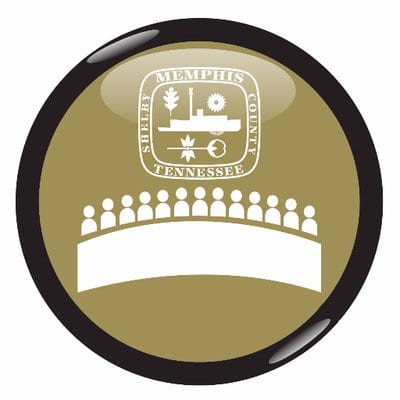With deadlines looming, Memphis City Council members Tuesday (June 27) shot down a proposed property-tax increase and approved a fix of district lines before the upcoming city elections to close out this year’s budget season.
Council Chairman Martavius Jones’ proposed 29-cent property tax (the current rate is $2.71) increase per $100 assessed value, would have funded a variety of priorities, including more money for Memphis Area Transit Authority (MATA).
The relatively cooperative decision on not raising the property tax was not mirrored in the contentious discussion, especially between Jones and council attorney Allan Wade, about approving new council district lines in time for the Oct. 5 city elections. The council approved a plan that basically left the current boundaries intact.
Making a final pitch for his property-tax-hike proposal, Jones said, “This would generate an additional revenue of approximately $40.6 million. The largest beneficiary of this would be the Memphis Transit Authority…
“As proposed and as presented, there’s a second large allocation that would be dedicated to…we can call it, public works. we can call it, solid waste…I think the public would agree, the city is as dirty and as nasty as it’s ever been.”
The tax hike was voted down 10-2.
Its demise means Memphis and Shelby County residents will not see an increase in their property taxes this fiscal year. The Shelby County Commission Monday (June 26) voted to keep the county’s rate at $3.39 per $100 of assessed value.
The commission Wednesday (June 8), however, approved a $25 hike in the wheel tax. The money will be for rebuilding the county’s Regional One Health hospital and new high schools in Frayser and Cordova. County Mayor Lee Harris had sought a $50 increase in the wheel tax.
The new tax will partially fund the construction of a new Region One Hospital campus, as well as high schools in Frayser and Cordova.
During Tuesday’s council meeting, the fate of Jones’ tax-hike proposal was sealed after Budget Committee Chairman Chase Carlisle, along with fellow members, hashed out a set of changes to Mayor Jim Strickland’s proposed $792 million fiscal 2023-2024 budget, which begins July 1.
The restructuring freed up $12 million to fund priorities that include $5 million to the city’s Affordable Housing Trust Fund, $3 million to fund the Memphis Transit Authority and $2.3 million towards youth programming for Memphis Public libraries.
Bellevue Tennis Center will also receive $1.5 million for new tennis courts. The remaining $1.5 million will partially fund construction of Hospitality Hub North.
During the weeks-long wrangling over Jones’ ill-fated tax increase, he criticized Strickland’s budget for its lack of ambition.
In addition to youth programs to curb crime, he sought heftier funding for MATA. The current funding, which he has called “bareboned,” will fund existing operations. Four cents of Jones’ increase would have gone to the city’s affordable housing trust fund. During the runup to the vote, he remarked on Shelby County Commissioner Erika Sugarmon’s efforts to raise county taxes.
“She talked about the fact that we’ve had a lot of out-of-town investors come in. We have a lot of people who’ve raised rents precipitously. In this inflationary environment, we, as a city, see no benefit from that…Rental rates have gone up and we’ve not done anything to address the affordable housing crisis we have here in the city,” said Jones.
In his last six months in office, Strickland’s budget is a $42 million increase over this year’s. It did not include a tax increase. As in past years, most additional funding is devoted to the Memphis Police and Fire Departments. Both departments will receive an additional 14 percent for base salaries and nine percent toward retention bonuses.
Voting against the tax increase were Councilmembers Worth Morgan, Rhonda Logan, Frank Colvett, Patrice J. Robinson, Jana Swearengen-Washington, Edmund Ford Sr., Michalyn Easter-Thomas, Ford Canale, Jeff Warren, and Carlisle.
Vice Chair JB Smiley Jr. and Jones voted in favor. Cheyenne Johnson abstained.
The move to redraw district lines, meanwhile, is an effort to correct an error made during last year’s District 4 special election. Those boundaries included areas that had been de-annexed by the city.
Council members voted 8-4 to move a precinct located in the northeast section of District 5 to nearby District 2. The change provides Memphis’ seven single-member districts close to parity in population.
Only precinct 13-01, with its 7,700 residents, is affected. Its polling place is Berclair Elementary School.
The district lines are now set for the upcoming city elections in October. Candidates are currently pulling petitions for all 13 council seats.
Voting in favor were Morgan, Ford, Johnson, Canale, Smiley, Warren, Swearengen-Washington, and Carlisle.
Members Easter-Thomas, Logan, Robinson, and Jones voted no.
Jones called the process for determining the new boundaries “undemocratic.” He was among council members who wanted to see more substantial change, which they said would better reflect the community and population shifts over the decades. Cordova residents also lobbied for a Cordova-only district.
Wade, the council’s attorney, said the massive changes Jones and others wanted had issues, such as racial imbalances, that would have required federal court approval.
“It has to be race-neutral — only counting human beings, not what color they are,” he said. “Anything else has to go to federal court.”
Wade also cited the closeness of the city elections with candidates already pulling petitions to get on the ballot against a July 20 deadline to file with the Election Commission.



